Organisational Behaviour: Argos Culture, Motivation, and Teams
VerifiedAdded on 2023/01/10
|17
|5091
|27
Report
AI Summary
This report provides a comprehensive analysis of organisational behaviour within the context of Argos, a UK retailer. It begins by defining organisational behaviour and then delves into the impact of organisational culture, power, and politics on individual and team performance. The report uses Handy's culture model and Hofstede's cultural dimensions to evaluate Argos's culture and examines the different types of power that influence employee behaviour. It then explores the influence of organisational politics, distinguishing between 'good' and 'bad' politics and their impact on the organisation. The report also examines content and process theories of motivation, including McClelland's theory of needs and the application of these theories within Argos. Furthermore, the report differentiates between effective and ineffective teams, highlighting key characteristics and factors influencing team success. Finally, the report examines the application of various concepts and philosophies related to organisational behaviour within Argos. The report concludes by summarizing the key findings and offering insights into how Argos can improve its organisational behaviour practices to enhance employee performance and overall organisational effectiveness.
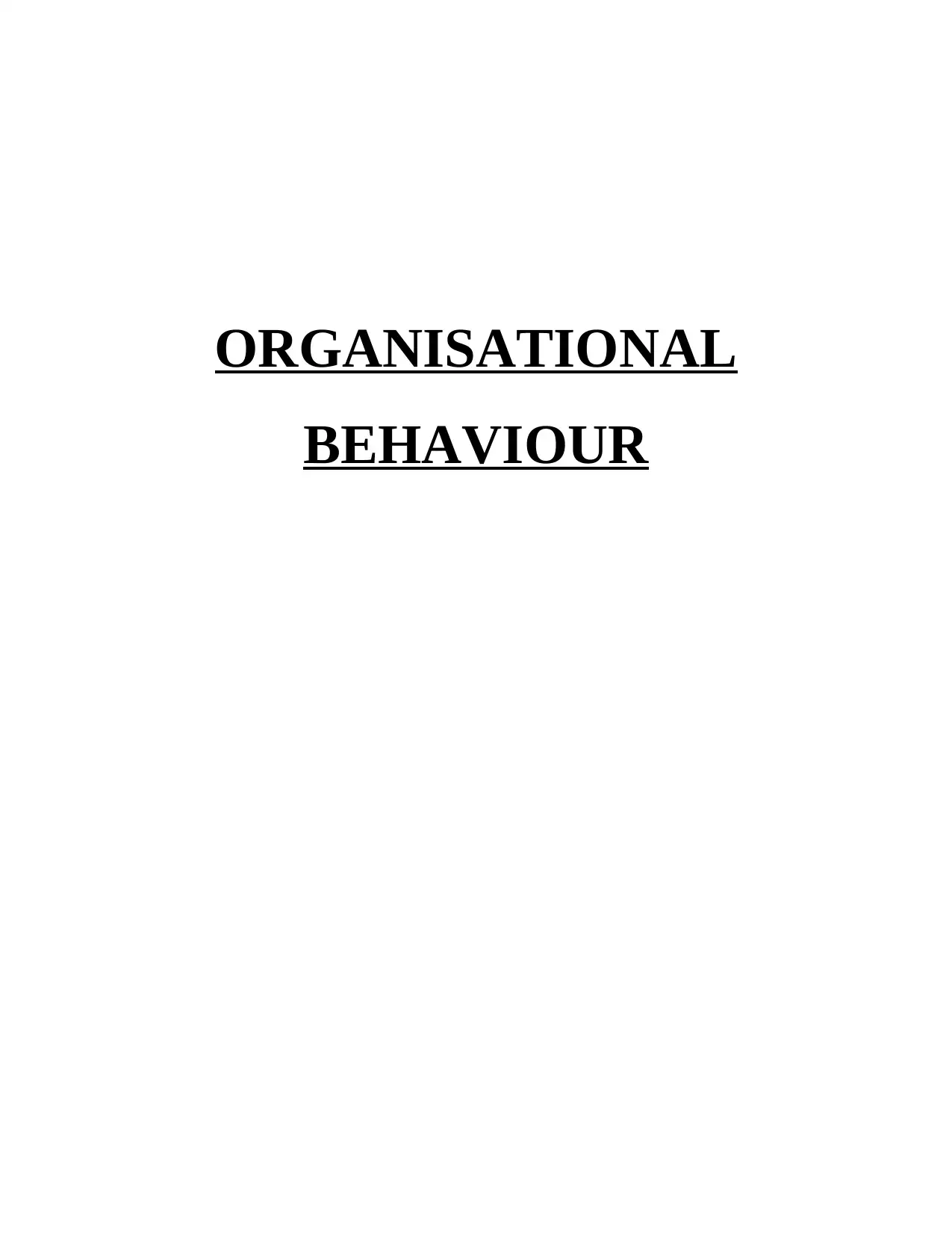
ORGANISATIONAL
BEHAVIOUR
BEHAVIOUR
Paraphrase This Document
Need a fresh take? Get an instant paraphrase of this document with our AI Paraphraser
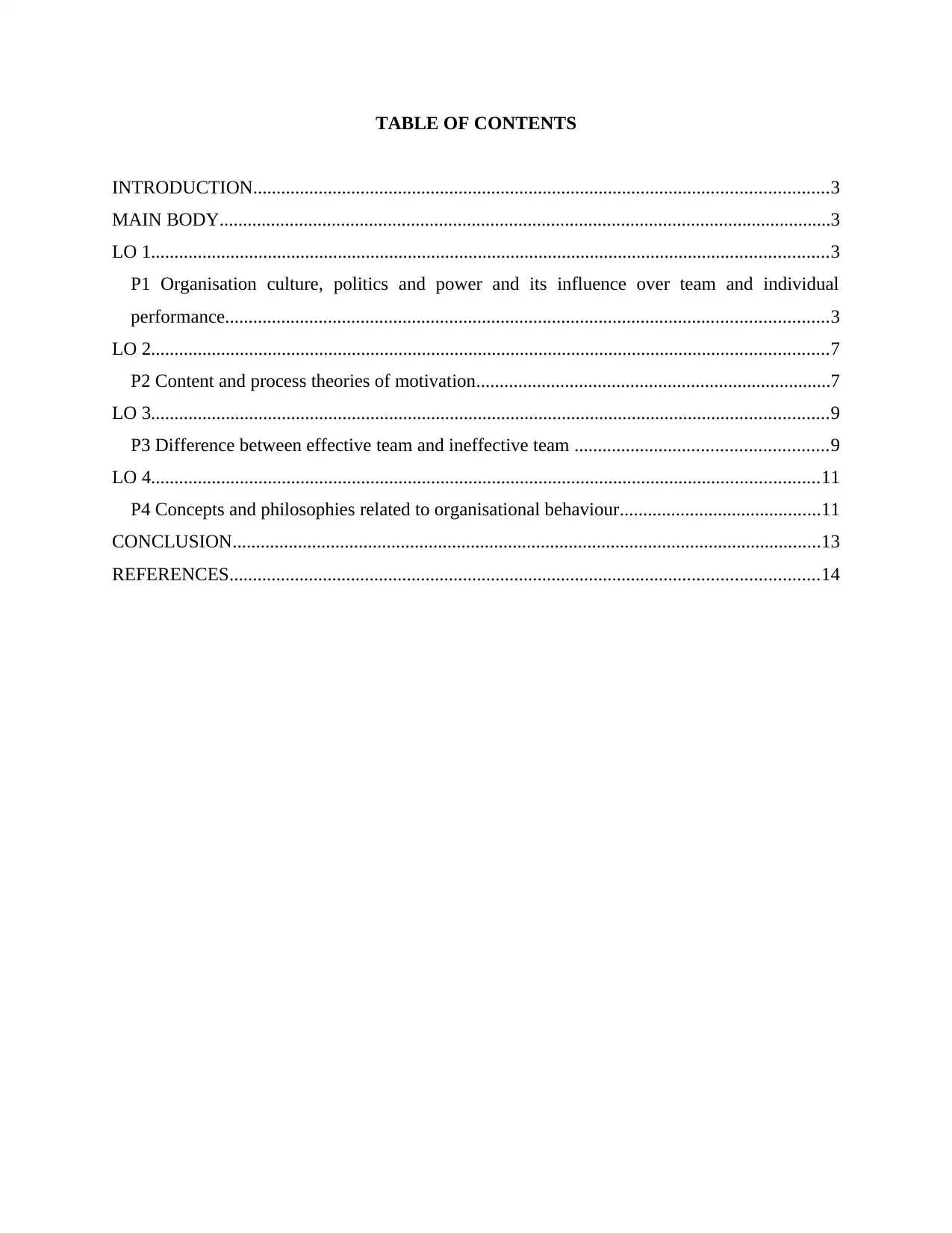
TABLE OF CONTENTS
INTRODUCTION...........................................................................................................................3
MAIN BODY...................................................................................................................................3
LO 1.................................................................................................................................................3
P1 Organisation culture, politics and power and its influence over team and individual
performance.................................................................................................................................3
LO 2.................................................................................................................................................7
P2 Content and process theories of motivation............................................................................7
LO 3.................................................................................................................................................9
P3 Difference between effective team and ineffective team ......................................................9
LO 4...............................................................................................................................................11
P4 Concepts and philosophies related to organisational behaviour...........................................11
CONCLUSION..............................................................................................................................13
REFERENCES..............................................................................................................................14
INTRODUCTION...........................................................................................................................3
MAIN BODY...................................................................................................................................3
LO 1.................................................................................................................................................3
P1 Organisation culture, politics and power and its influence over team and individual
performance.................................................................................................................................3
LO 2.................................................................................................................................................7
P2 Content and process theories of motivation............................................................................7
LO 3.................................................................................................................................................9
P3 Difference between effective team and ineffective team ......................................................9
LO 4...............................................................................................................................................11
P4 Concepts and philosophies related to organisational behaviour...........................................11
CONCLUSION..............................................................................................................................13
REFERENCES..............................................................................................................................14
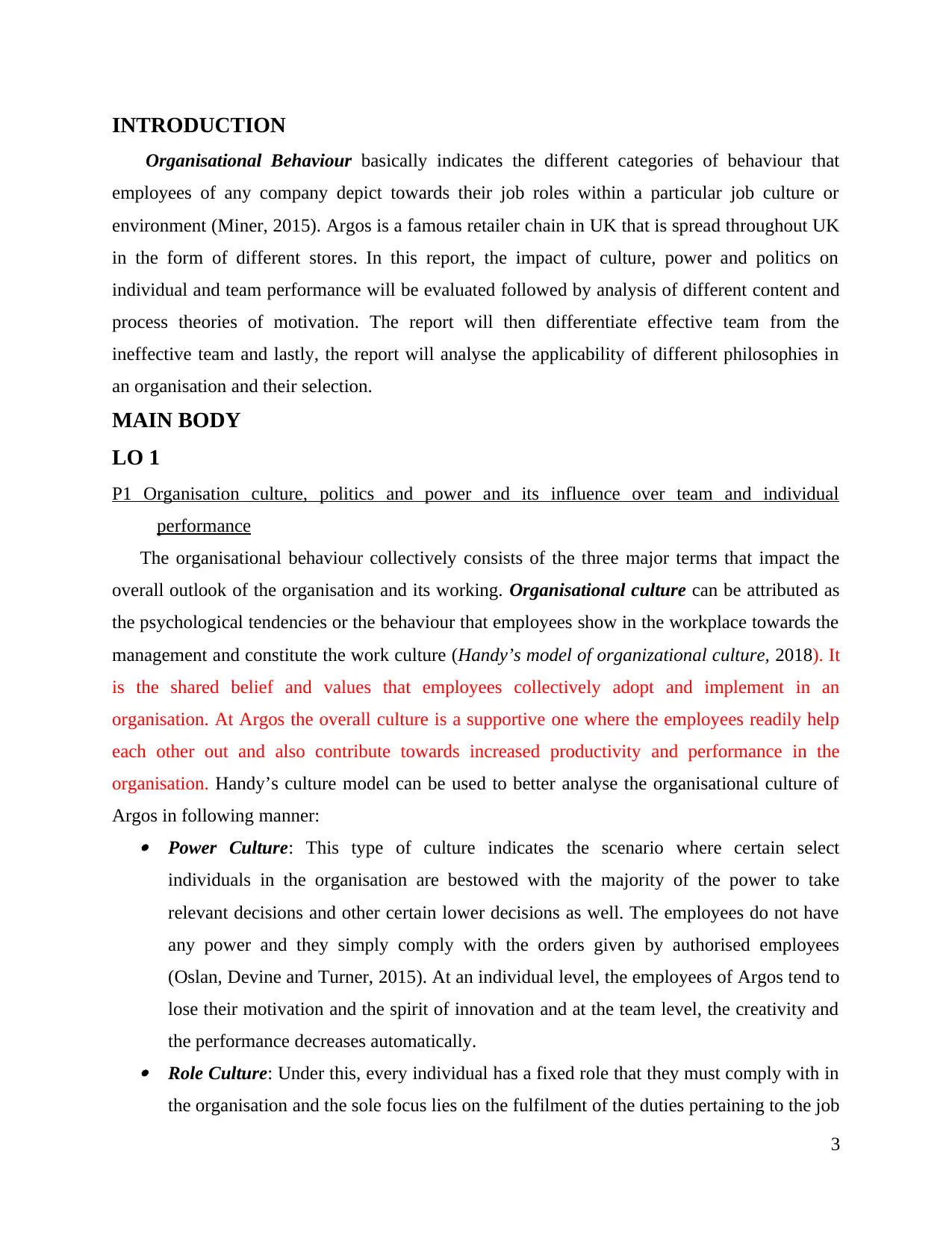
INTRODUCTION
Organisational Behaviour basically indicates the different categories of behaviour that
employees of any company depict towards their job roles within a particular job culture or
environment (Miner, 2015). Argos is a famous retailer chain in UK that is spread throughout UK
in the form of different stores. In this report, the impact of culture, power and politics on
individual and team performance will be evaluated followed by analysis of different content and
process theories of motivation. The report will then differentiate effective team from the
ineffective team and lastly, the report will analyse the applicability of different philosophies in
an organisation and their selection.
MAIN BODY
LO 1
P1 Organisation culture, politics and power and its influence over team and individual
performance
The organisational behaviour collectively consists of the three major terms that impact the
overall outlook of the organisation and its working. Organisational culture can be attributed as
the psychological tendencies or the behaviour that employees show in the workplace towards the
management and constitute the work culture (Handy’s model of organizational culture, 2018). It
is the shared belief and values that employees collectively adopt and implement in an
organisation. At Argos the overall culture is a supportive one where the employees readily help
each other out and also contribute towards increased productivity and performance in the
organisation. Handy’s culture model can be used to better analyse the organisational culture of
Argos in following manner: Power Culture: This type of culture indicates the scenario where certain select
individuals in the organisation are bestowed with the majority of the power to take
relevant decisions and other certain lower decisions as well. The employees do not have
any power and they simply comply with the orders given by authorised employees
(Oslan, Devine and Turner, 2015). At an individual level, the employees of Argos tend to
lose their motivation and the spirit of innovation and at the team level, the creativity and
the performance decreases automatically. Role Culture: Under this, every individual has a fixed role that they must comply with in
the organisation and the sole focus lies on the fulfilment of the duties pertaining to the job
3
Organisational Behaviour basically indicates the different categories of behaviour that
employees of any company depict towards their job roles within a particular job culture or
environment (Miner, 2015). Argos is a famous retailer chain in UK that is spread throughout UK
in the form of different stores. In this report, the impact of culture, power and politics on
individual and team performance will be evaluated followed by analysis of different content and
process theories of motivation. The report will then differentiate effective team from the
ineffective team and lastly, the report will analyse the applicability of different philosophies in
an organisation and their selection.
MAIN BODY
LO 1
P1 Organisation culture, politics and power and its influence over team and individual
performance
The organisational behaviour collectively consists of the three major terms that impact the
overall outlook of the organisation and its working. Organisational culture can be attributed as
the psychological tendencies or the behaviour that employees show in the workplace towards the
management and constitute the work culture (Handy’s model of organizational culture, 2018). It
is the shared belief and values that employees collectively adopt and implement in an
organisation. At Argos the overall culture is a supportive one where the employees readily help
each other out and also contribute towards increased productivity and performance in the
organisation. Handy’s culture model can be used to better analyse the organisational culture of
Argos in following manner: Power Culture: This type of culture indicates the scenario where certain select
individuals in the organisation are bestowed with the majority of the power to take
relevant decisions and other certain lower decisions as well. The employees do not have
any power and they simply comply with the orders given by authorised employees
(Oslan, Devine and Turner, 2015). At an individual level, the employees of Argos tend to
lose their motivation and the spirit of innovation and at the team level, the creativity and
the performance decreases automatically. Role Culture: Under this, every individual has a fixed role that they must comply with in
the organisation and the sole focus lies on the fulfilment of the duties pertaining to the job
3
⊘ This is a preview!⊘
Do you want full access?
Subscribe today to unlock all pages.

Trusted by 1+ million students worldwide
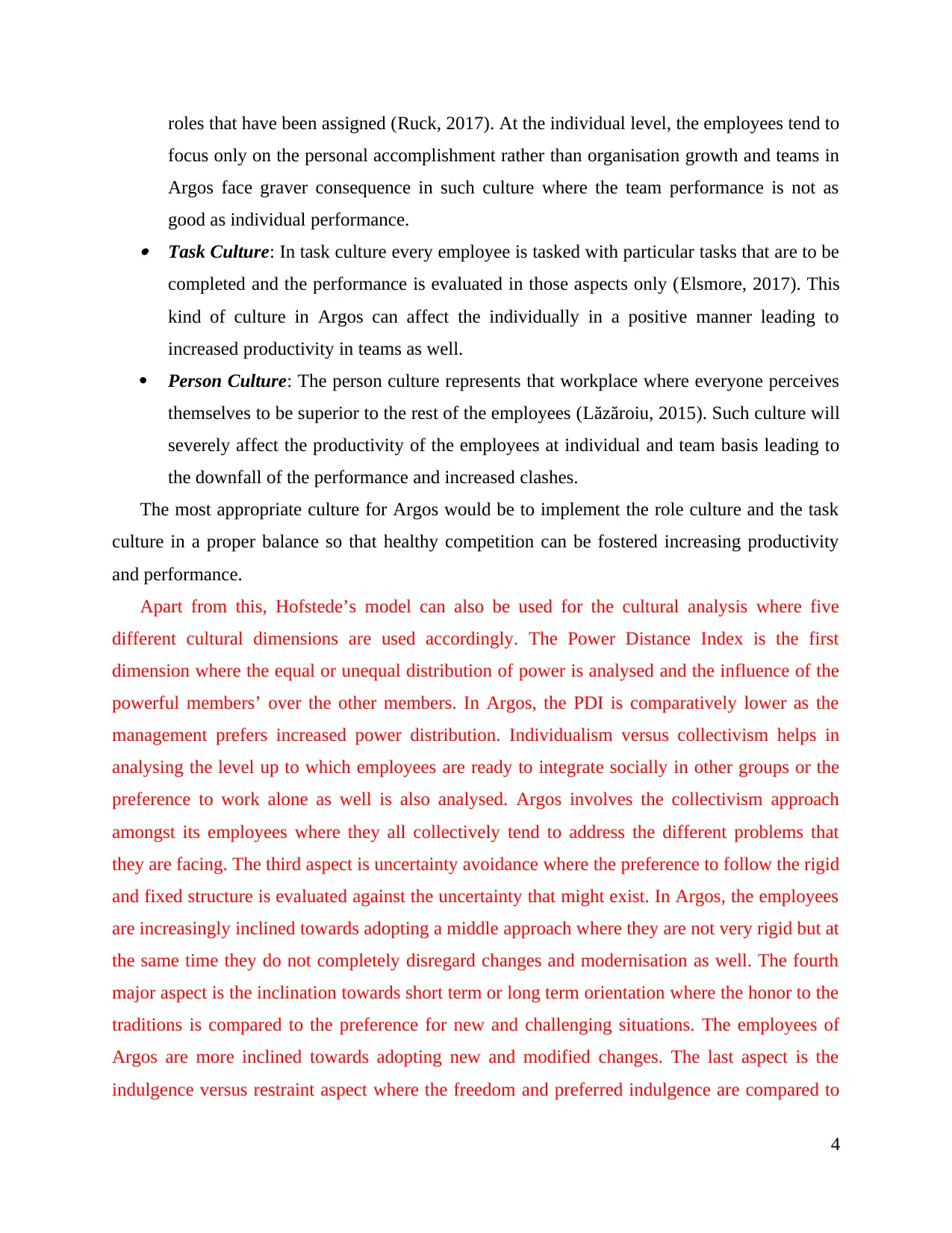
roles that have been assigned (Ruck, 2017). At the individual level, the employees tend to
focus only on the personal accomplishment rather than organisation growth and teams in
Argos face graver consequence in such culture where the team performance is not as
good as individual performance. Task Culture: In task culture every employee is tasked with particular tasks that are to be
completed and the performance is evaluated in those aspects only (Elsmore, 2017). This
kind of culture in Argos can affect the individually in a positive manner leading to
increased productivity in teams as well.
Person Culture: The person culture represents that workplace where everyone perceives
themselves to be superior to the rest of the employees (Lăzăroiu, 2015). Such culture will
severely affect the productivity of the employees at individual and team basis leading to
the downfall of the performance and increased clashes.
The most appropriate culture for Argos would be to implement the role culture and the task
culture in a proper balance so that healthy competition can be fostered increasing productivity
and performance.
Apart from this, Hofstede’s model can also be used for the cultural analysis where five
different cultural dimensions are used accordingly. The Power Distance Index is the first
dimension where the equal or unequal distribution of power is analysed and the influence of the
powerful members’ over the other members. In Argos, the PDI is comparatively lower as the
management prefers increased power distribution. Individualism versus collectivism helps in
analysing the level up to which employees are ready to integrate socially in other groups or the
preference to work alone as well is also analysed. Argos involves the collectivism approach
amongst its employees where they all collectively tend to address the different problems that
they are facing. The third aspect is uncertainty avoidance where the preference to follow the rigid
and fixed structure is evaluated against the uncertainty that might exist. In Argos, the employees
are increasingly inclined towards adopting a middle approach where they are not very rigid but at
the same time they do not completely disregard changes and modernisation as well. The fourth
major aspect is the inclination towards short term or long term orientation where the honor to the
traditions is compared to the preference for new and challenging situations. The employees of
Argos are more inclined towards adopting new and modified changes. The last aspect is the
indulgence versus restraint aspect where the freedom and preferred indulgence are compared to
4
focus only on the personal accomplishment rather than organisation growth and teams in
Argos face graver consequence in such culture where the team performance is not as
good as individual performance. Task Culture: In task culture every employee is tasked with particular tasks that are to be
completed and the performance is evaluated in those aspects only (Elsmore, 2017). This
kind of culture in Argos can affect the individually in a positive manner leading to
increased productivity in teams as well.
Person Culture: The person culture represents that workplace where everyone perceives
themselves to be superior to the rest of the employees (Lăzăroiu, 2015). Such culture will
severely affect the productivity of the employees at individual and team basis leading to
the downfall of the performance and increased clashes.
The most appropriate culture for Argos would be to implement the role culture and the task
culture in a proper balance so that healthy competition can be fostered increasing productivity
and performance.
Apart from this, Hofstede’s model can also be used for the cultural analysis where five
different cultural dimensions are used accordingly. The Power Distance Index is the first
dimension where the equal or unequal distribution of power is analysed and the influence of the
powerful members’ over the other members. In Argos, the PDI is comparatively lower as the
management prefers increased power distribution. Individualism versus collectivism helps in
analysing the level up to which employees are ready to integrate socially in other groups or the
preference to work alone as well is also analysed. Argos involves the collectivism approach
amongst its employees where they all collectively tend to address the different problems that
they are facing. The third aspect is uncertainty avoidance where the preference to follow the rigid
and fixed structure is evaluated against the uncertainty that might exist. In Argos, the employees
are increasingly inclined towards adopting a middle approach where they are not very rigid but at
the same time they do not completely disregard changes and modernisation as well. The fourth
major aspect is the inclination towards short term or long term orientation where the honor to the
traditions is compared to the preference for new and challenging situations. The employees of
Argos are more inclined towards adopting new and modified changes. The last aspect is the
indulgence versus restraint aspect where the freedom and preferred indulgence are compared to
4
Paraphrase This Document
Need a fresh take? Get an instant paraphrase of this document with our AI Paraphraser
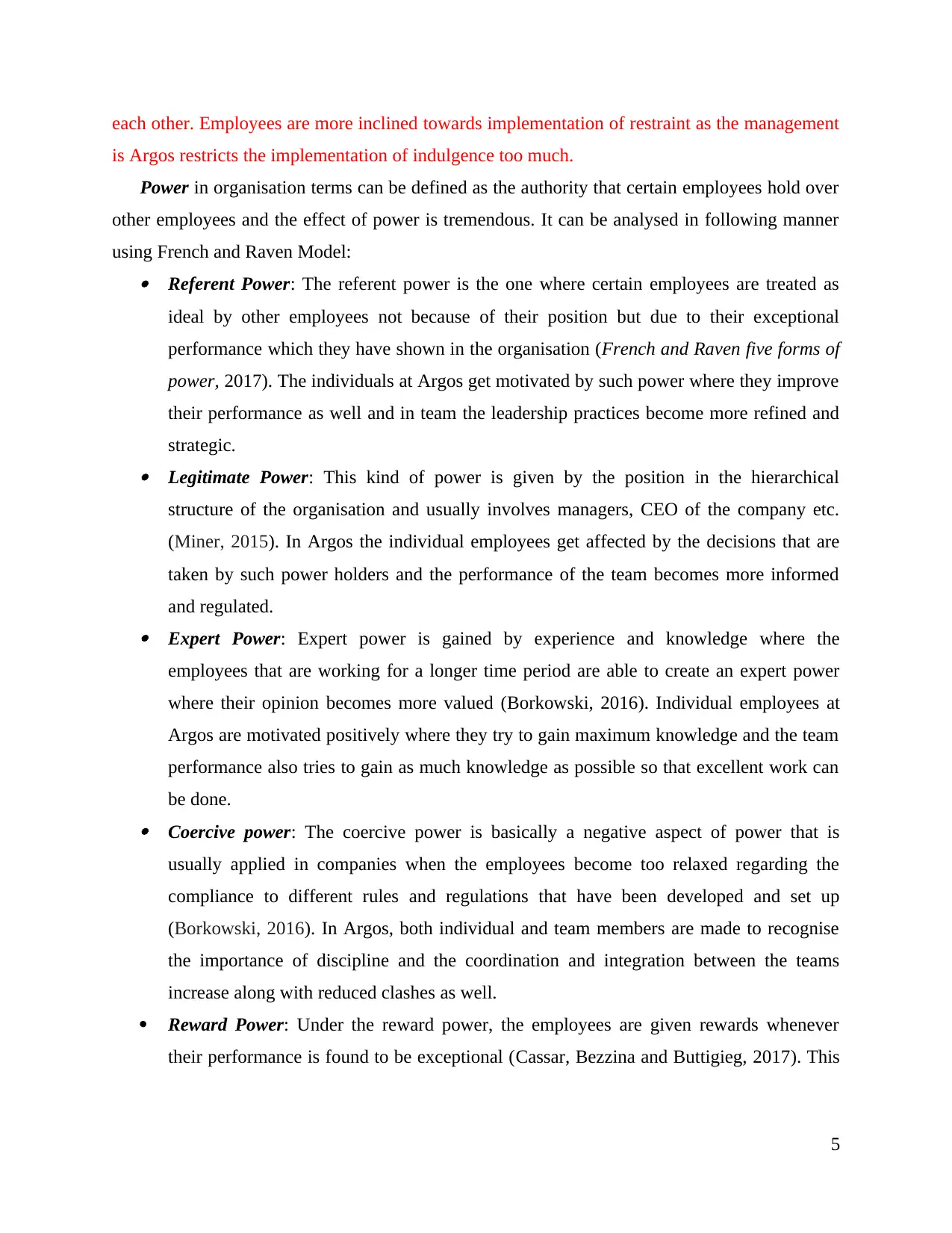
each other. Employees are more inclined towards implementation of restraint as the management
is Argos restricts the implementation of indulgence too much.
Power in organisation terms can be defined as the authority that certain employees hold over
other employees and the effect of power is tremendous. It can be analysed in following manner
using French and Raven Model: Referent Power: The referent power is the one where certain employees are treated as
ideal by other employees not because of their position but due to their exceptional
performance which they have shown in the organisation (French and Raven five forms of
power, 2017). The individuals at Argos get motivated by such power where they improve
their performance as well and in team the leadership practices become more refined and
strategic. Legitimate Power: This kind of power is given by the position in the hierarchical
structure of the organisation and usually involves managers, CEO of the company etc.
(Miner, 2015). In Argos the individual employees get affected by the decisions that are
taken by such power holders and the performance of the team becomes more informed
and regulated. Expert Power: Expert power is gained by experience and knowledge where the
employees that are working for a longer time period are able to create an expert power
where their opinion becomes more valued (Borkowski, 2016). Individual employees at
Argos are motivated positively where they try to gain maximum knowledge and the team
performance also tries to gain as much knowledge as possible so that excellent work can
be done. Coercive power: The coercive power is basically a negative aspect of power that is
usually applied in companies when the employees become too relaxed regarding the
compliance to different rules and regulations that have been developed and set up
(Borkowski, 2016). In Argos, both individual and team members are made to recognise
the importance of discipline and the coordination and integration between the teams
increase along with reduced clashes as well.
Reward Power: Under the reward power, the employees are given rewards whenever
their performance is found to be exceptional (Cassar, Bezzina and Buttigieg, 2017). This
5
is Argos restricts the implementation of indulgence too much.
Power in organisation terms can be defined as the authority that certain employees hold over
other employees and the effect of power is tremendous. It can be analysed in following manner
using French and Raven Model: Referent Power: The referent power is the one where certain employees are treated as
ideal by other employees not because of their position but due to their exceptional
performance which they have shown in the organisation (French and Raven five forms of
power, 2017). The individuals at Argos get motivated by such power where they improve
their performance as well and in team the leadership practices become more refined and
strategic. Legitimate Power: This kind of power is given by the position in the hierarchical
structure of the organisation and usually involves managers, CEO of the company etc.
(Miner, 2015). In Argos the individual employees get affected by the decisions that are
taken by such power holders and the performance of the team becomes more informed
and regulated. Expert Power: Expert power is gained by experience and knowledge where the
employees that are working for a longer time period are able to create an expert power
where their opinion becomes more valued (Borkowski, 2016). Individual employees at
Argos are motivated positively where they try to gain maximum knowledge and the team
performance also tries to gain as much knowledge as possible so that excellent work can
be done. Coercive power: The coercive power is basically a negative aspect of power that is
usually applied in companies when the employees become too relaxed regarding the
compliance to different rules and regulations that have been developed and set up
(Borkowski, 2016). In Argos, both individual and team members are made to recognise
the importance of discipline and the coordination and integration between the teams
increase along with reduced clashes as well.
Reward Power: Under the reward power, the employees are given rewards whenever
their performance is found to be exceptional (Cassar, Bezzina and Buttigieg, 2017). This
5
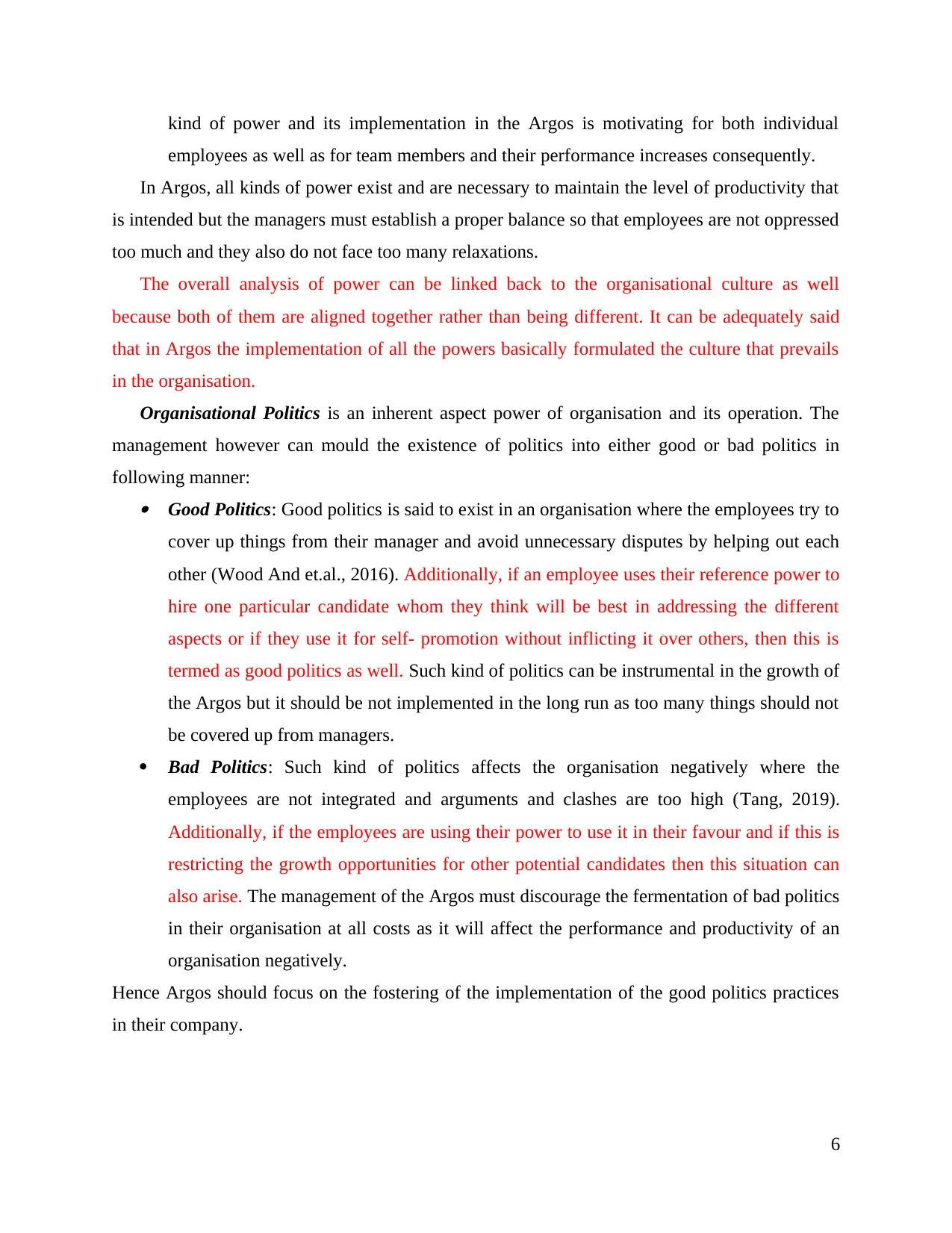
kind of power and its implementation in the Argos is motivating for both individual
employees as well as for team members and their performance increases consequently.
In Argos, all kinds of power exist and are necessary to maintain the level of productivity that
is intended but the managers must establish a proper balance so that employees are not oppressed
too much and they also do not face too many relaxations.
The overall analysis of power can be linked back to the organisational culture as well
because both of them are aligned together rather than being different. It can be adequately said
that in Argos the implementation of all the powers basically formulated the culture that prevails
in the organisation.
Organisational Politics is an inherent aspect power of organisation and its operation. The
management however can mould the existence of politics into either good or bad politics in
following manner: Good Politics: Good politics is said to exist in an organisation where the employees try to
cover up things from their manager and avoid unnecessary disputes by helping out each
other (Wood And et.al., 2016). Additionally, if an employee uses their reference power to
hire one particular candidate whom they think will be best in addressing the different
aspects or if they use it for self- promotion without inflicting it over others, then this is
termed as good politics as well. Such kind of politics can be instrumental in the growth of
the Argos but it should be not implemented in the long run as too many things should not
be covered up from managers.
Bad Politics: Such kind of politics affects the organisation negatively where the
employees are not integrated and arguments and clashes are too high (Tang, 2019).
Additionally, if the employees are using their power to use it in their favour and if this is
restricting the growth opportunities for other potential candidates then this situation can
also arise. The management of the Argos must discourage the fermentation of bad politics
in their organisation at all costs as it will affect the performance and productivity of an
organisation negatively.
Hence Argos should focus on the fostering of the implementation of the good politics practices
in their company.
6
employees as well as for team members and their performance increases consequently.
In Argos, all kinds of power exist and are necessary to maintain the level of productivity that
is intended but the managers must establish a proper balance so that employees are not oppressed
too much and they also do not face too many relaxations.
The overall analysis of power can be linked back to the organisational culture as well
because both of them are aligned together rather than being different. It can be adequately said
that in Argos the implementation of all the powers basically formulated the culture that prevails
in the organisation.
Organisational Politics is an inherent aspect power of organisation and its operation. The
management however can mould the existence of politics into either good or bad politics in
following manner: Good Politics: Good politics is said to exist in an organisation where the employees try to
cover up things from their manager and avoid unnecessary disputes by helping out each
other (Wood And et.al., 2016). Additionally, if an employee uses their reference power to
hire one particular candidate whom they think will be best in addressing the different
aspects or if they use it for self- promotion without inflicting it over others, then this is
termed as good politics as well. Such kind of politics can be instrumental in the growth of
the Argos but it should be not implemented in the long run as too many things should not
be covered up from managers.
Bad Politics: Such kind of politics affects the organisation negatively where the
employees are not integrated and arguments and clashes are too high (Tang, 2019).
Additionally, if the employees are using their power to use it in their favour and if this is
restricting the growth opportunities for other potential candidates then this situation can
also arise. The management of the Argos must discourage the fermentation of bad politics
in their organisation at all costs as it will affect the performance and productivity of an
organisation negatively.
Hence Argos should focus on the fostering of the implementation of the good politics practices
in their company.
6
⊘ This is a preview!⊘
Do you want full access?
Subscribe today to unlock all pages.

Trusted by 1+ million students worldwide
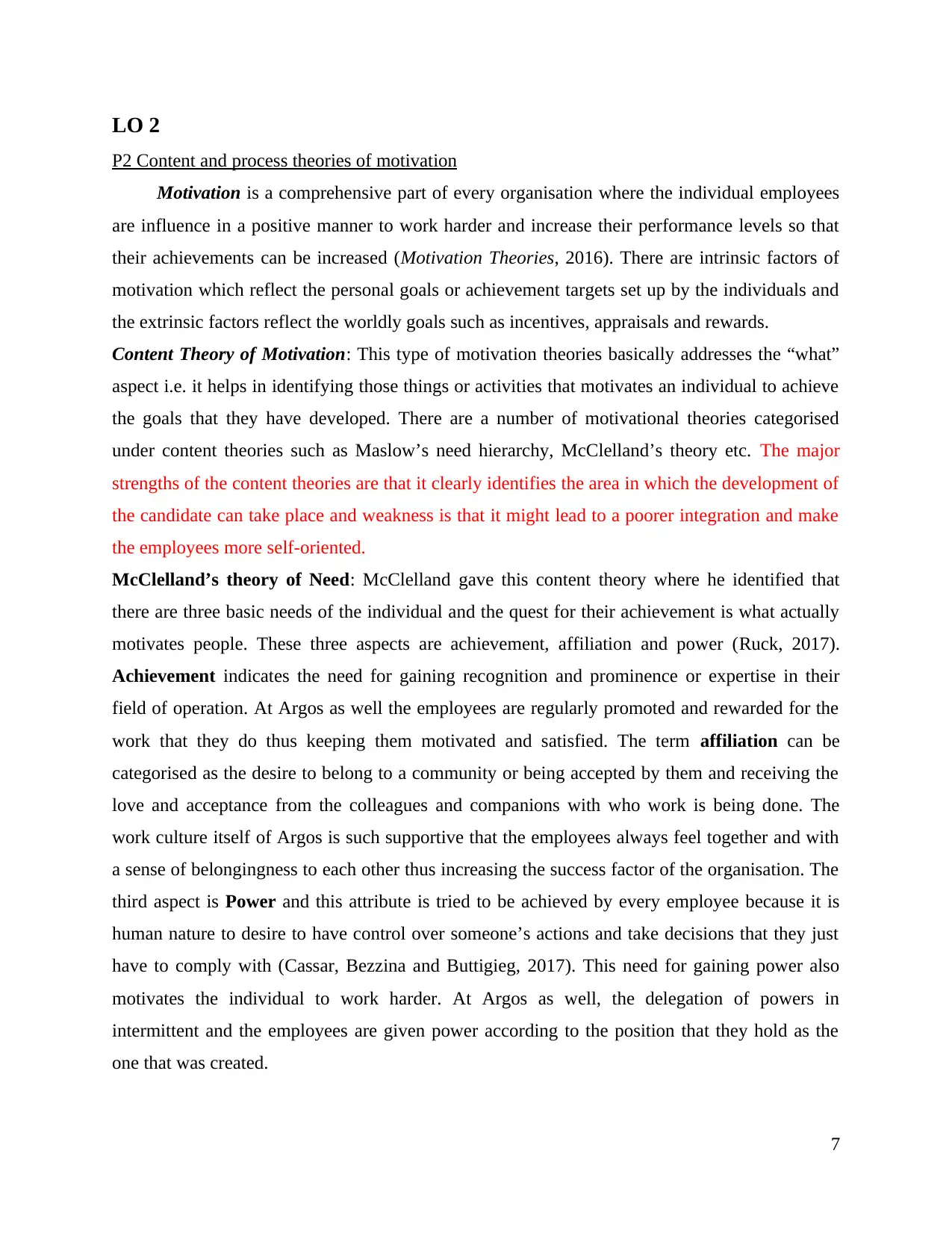
LO 2
P2 Content and process theories of motivation
Motivation is a comprehensive part of every organisation where the individual employees
are influence in a positive manner to work harder and increase their performance levels so that
their achievements can be increased (Motivation Theories, 2016). There are intrinsic factors of
motivation which reflect the personal goals or achievement targets set up by the individuals and
the extrinsic factors reflect the worldly goals such as incentives, appraisals and rewards.
Content Theory of Motivation: This type of motivation theories basically addresses the “what”
aspect i.e. it helps in identifying those things or activities that motivates an individual to achieve
the goals that they have developed. There are a number of motivational theories categorised
under content theories such as Maslow’s need hierarchy, McClelland’s theory etc. The major
strengths of the content theories are that it clearly identifies the area in which the development of
the candidate can take place and weakness is that it might lead to a poorer integration and make
the employees more self-oriented.
McClelland’s theory of Need: McClelland gave this content theory where he identified that
there are three basic needs of the individual and the quest for their achievement is what actually
motivates people. These three aspects are achievement, affiliation and power (Ruck, 2017).
Achievement indicates the need for gaining recognition and prominence or expertise in their
field of operation. At Argos as well the employees are regularly promoted and rewarded for the
work that they do thus keeping them motivated and satisfied. The term affiliation can be
categorised as the desire to belong to a community or being accepted by them and receiving the
love and acceptance from the colleagues and companions with who work is being done. The
work culture itself of Argos is such supportive that the employees always feel together and with
a sense of belongingness to each other thus increasing the success factor of the organisation. The
third aspect is Power and this attribute is tried to be achieved by every employee because it is
human nature to desire to have control over someone’s actions and take decisions that they just
have to comply with (Cassar, Bezzina and Buttigieg, 2017). This need for gaining power also
motivates the individual to work harder. At Argos as well, the delegation of powers in
intermittent and the employees are given power according to the position that they hold as the
one that was created.
7
P2 Content and process theories of motivation
Motivation is a comprehensive part of every organisation where the individual employees
are influence in a positive manner to work harder and increase their performance levels so that
their achievements can be increased (Motivation Theories, 2016). There are intrinsic factors of
motivation which reflect the personal goals or achievement targets set up by the individuals and
the extrinsic factors reflect the worldly goals such as incentives, appraisals and rewards.
Content Theory of Motivation: This type of motivation theories basically addresses the “what”
aspect i.e. it helps in identifying those things or activities that motivates an individual to achieve
the goals that they have developed. There are a number of motivational theories categorised
under content theories such as Maslow’s need hierarchy, McClelland’s theory etc. The major
strengths of the content theories are that it clearly identifies the area in which the development of
the candidate can take place and weakness is that it might lead to a poorer integration and make
the employees more self-oriented.
McClelland’s theory of Need: McClelland gave this content theory where he identified that
there are three basic needs of the individual and the quest for their achievement is what actually
motivates people. These three aspects are achievement, affiliation and power (Ruck, 2017).
Achievement indicates the need for gaining recognition and prominence or expertise in their
field of operation. At Argos as well the employees are regularly promoted and rewarded for the
work that they do thus keeping them motivated and satisfied. The term affiliation can be
categorised as the desire to belong to a community or being accepted by them and receiving the
love and acceptance from the colleagues and companions with who work is being done. The
work culture itself of Argos is such supportive that the employees always feel together and with
a sense of belongingness to each other thus increasing the success factor of the organisation. The
third aspect is Power and this attribute is tried to be achieved by every employee because it is
human nature to desire to have control over someone’s actions and take decisions that they just
have to comply with (Cassar, Bezzina and Buttigieg, 2017). This need for gaining power also
motivates the individual to work harder. At Argos as well, the delegation of powers in
intermittent and the employees are given power according to the position that they hold as the
one that was created.
7
Paraphrase This Document
Need a fresh take? Get an instant paraphrase of this document with our AI Paraphraser
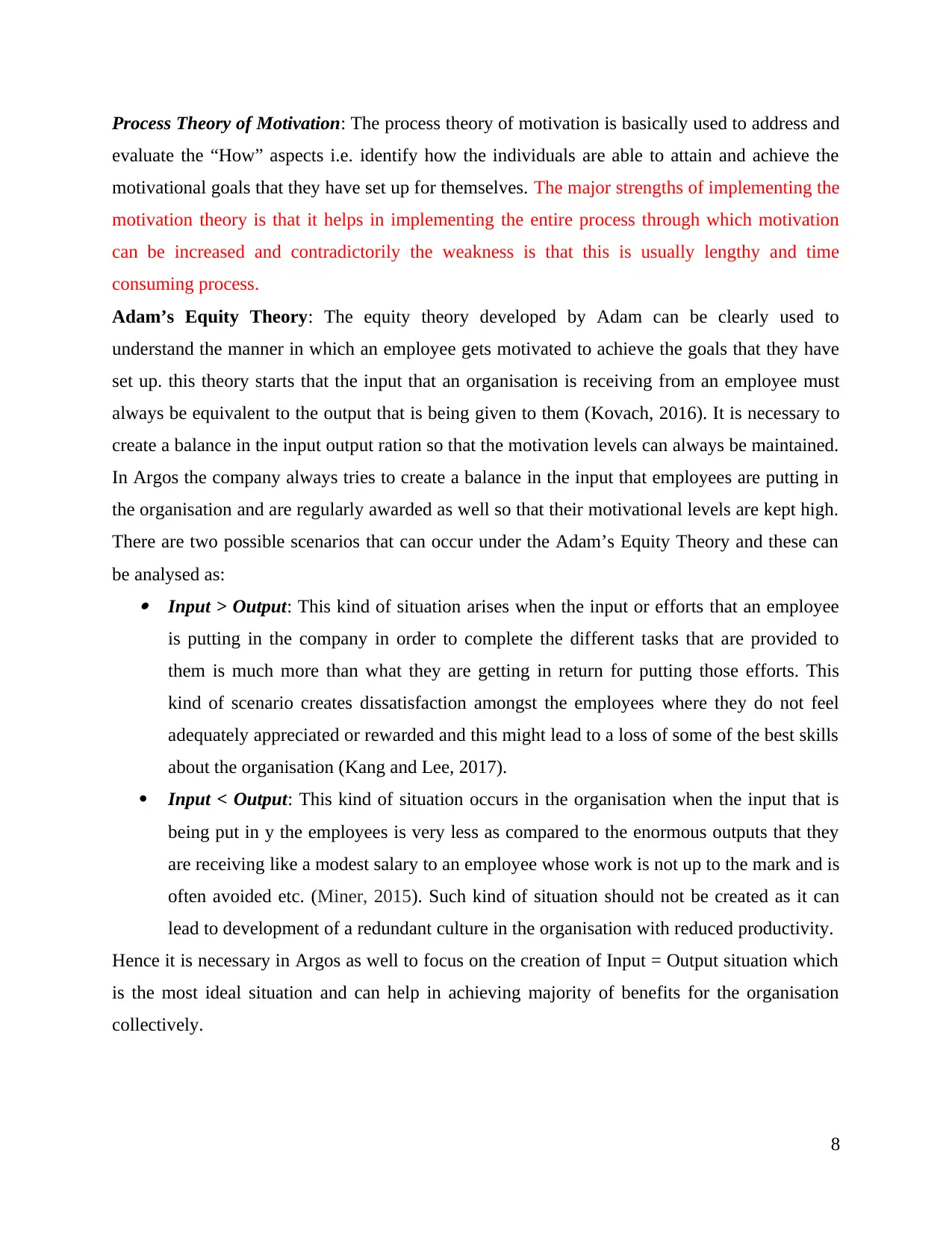
Process Theory of Motivation: The process theory of motivation is basically used to address and
evaluate the “How” aspects i.e. identify how the individuals are able to attain and achieve the
motivational goals that they have set up for themselves. The major strengths of implementing the
motivation theory is that it helps in implementing the entire process through which motivation
can be increased and contradictorily the weakness is that this is usually lengthy and time
consuming process.
Adam’s Equity Theory: The equity theory developed by Adam can be clearly used to
understand the manner in which an employee gets motivated to achieve the goals that they have
set up. this theory starts that the input that an organisation is receiving from an employee must
always be equivalent to the output that is being given to them (Kovach, 2016). It is necessary to
create a balance in the input output ration so that the motivation levels can always be maintained.
In Argos the company always tries to create a balance in the input that employees are putting in
the organisation and are regularly awarded as well so that their motivational levels are kept high.
There are two possible scenarios that can occur under the Adam’s Equity Theory and these can
be analysed as: Input > Output: This kind of situation arises when the input or efforts that an employee
is putting in the company in order to complete the different tasks that are provided to
them is much more than what they are getting in return for putting those efforts. This
kind of scenario creates dissatisfaction amongst the employees where they do not feel
adequately appreciated or rewarded and this might lead to a loss of some of the best skills
about the organisation (Kang and Lee, 2017).
Input < Output: This kind of situation occurs in the organisation when the input that is
being put in y the employees is very less as compared to the enormous outputs that they
are receiving like a modest salary to an employee whose work is not up to the mark and is
often avoided etc. (Miner, 2015). Such kind of situation should not be created as it can
lead to development of a redundant culture in the organisation with reduced productivity.
Hence it is necessary in Argos as well to focus on the creation of Input = Output situation which
is the most ideal situation and can help in achieving majority of benefits for the organisation
collectively.
8
evaluate the “How” aspects i.e. identify how the individuals are able to attain and achieve the
motivational goals that they have set up for themselves. The major strengths of implementing the
motivation theory is that it helps in implementing the entire process through which motivation
can be increased and contradictorily the weakness is that this is usually lengthy and time
consuming process.
Adam’s Equity Theory: The equity theory developed by Adam can be clearly used to
understand the manner in which an employee gets motivated to achieve the goals that they have
set up. this theory starts that the input that an organisation is receiving from an employee must
always be equivalent to the output that is being given to them (Kovach, 2016). It is necessary to
create a balance in the input output ration so that the motivation levels can always be maintained.
In Argos the company always tries to create a balance in the input that employees are putting in
the organisation and are regularly awarded as well so that their motivational levels are kept high.
There are two possible scenarios that can occur under the Adam’s Equity Theory and these can
be analysed as: Input > Output: This kind of situation arises when the input or efforts that an employee
is putting in the company in order to complete the different tasks that are provided to
them is much more than what they are getting in return for putting those efforts. This
kind of scenario creates dissatisfaction amongst the employees where they do not feel
adequately appreciated or rewarded and this might lead to a loss of some of the best skills
about the organisation (Kang and Lee, 2017).
Input < Output: This kind of situation occurs in the organisation when the input that is
being put in y the employees is very less as compared to the enormous outputs that they
are receiving like a modest salary to an employee whose work is not up to the mark and is
often avoided etc. (Miner, 2015). Such kind of situation should not be created as it can
lead to development of a redundant culture in the organisation with reduced productivity.
Hence it is necessary in Argos as well to focus on the creation of Input = Output situation which
is the most ideal situation and can help in achieving majority of benefits for the organisation
collectively.
8
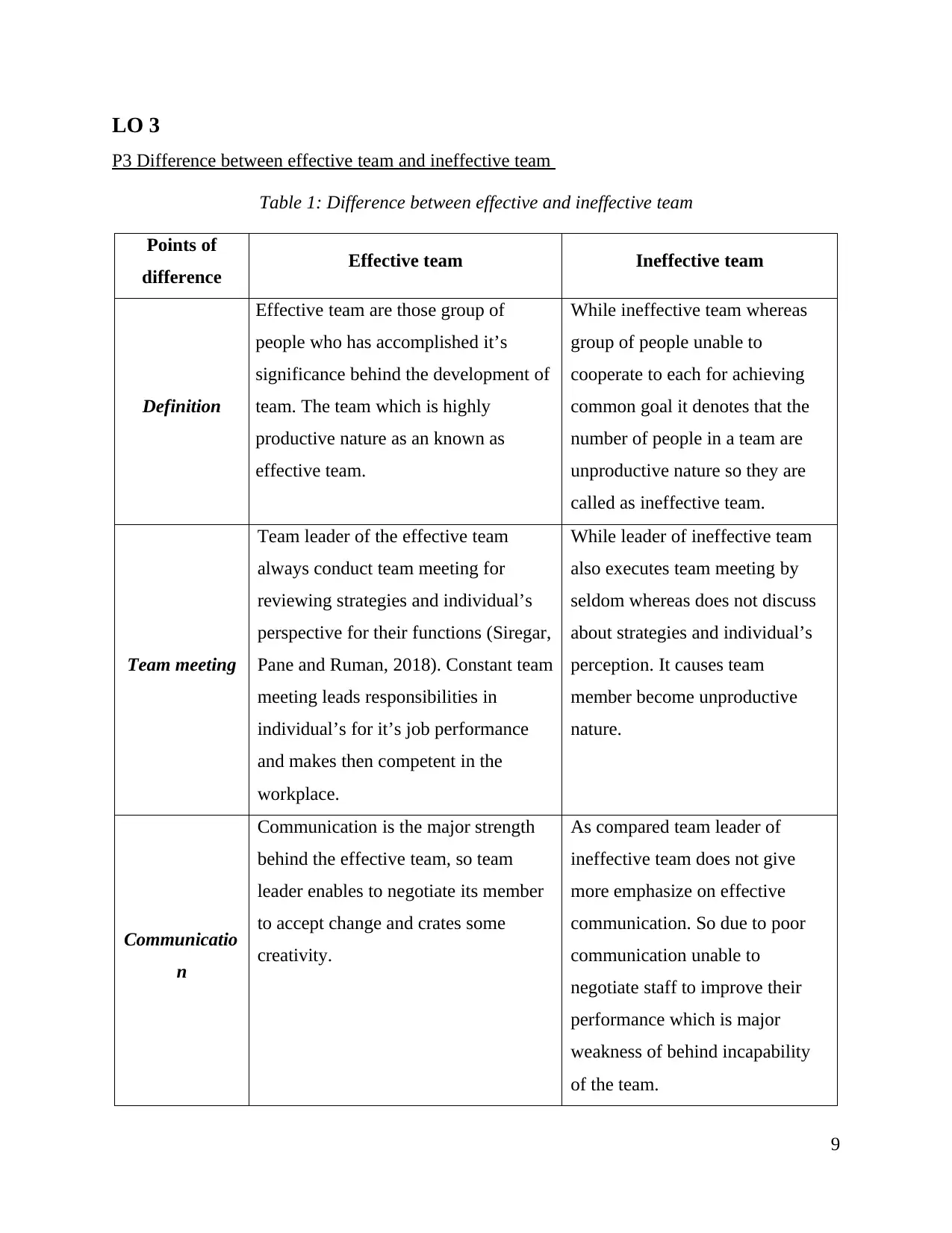
LO 3
P3 Difference between effective team and ineffective team
Table 1: Difference between effective and ineffective team
Points of
difference Effective team Ineffective team
Definition
Effective team are those group of
people who has accomplished it’s
significance behind the development of
team. The team which is highly
productive nature as an known as
effective team.
While ineffective team whereas
group of people unable to
cooperate to each for achieving
common goal it denotes that the
number of people in a team are
unproductive nature so they are
called as ineffective team.
Team meeting
Team leader of the effective team
always conduct team meeting for
reviewing strategies and individual’s
perspective for their functions (Siregar,
Pane and Ruman, 2018). Constant team
meeting leads responsibilities in
individual’s for it’s job performance
and makes then competent in the
workplace.
While leader of ineffective team
also executes team meeting by
seldom whereas does not discuss
about strategies and individual’s
perception. It causes team
member become unproductive
nature.
Communicatio
n
Communication is the major strength
behind the effective team, so team
leader enables to negotiate its member
to accept change and crates some
creativity.
As compared team leader of
ineffective team does not give
more emphasize on effective
communication. So due to poor
communication unable to
negotiate staff to improve their
performance which is major
weakness of behind incapability
of the team.
9
P3 Difference between effective team and ineffective team
Table 1: Difference between effective and ineffective team
Points of
difference Effective team Ineffective team
Definition
Effective team are those group of
people who has accomplished it’s
significance behind the development of
team. The team which is highly
productive nature as an known as
effective team.
While ineffective team whereas
group of people unable to
cooperate to each for achieving
common goal it denotes that the
number of people in a team are
unproductive nature so they are
called as ineffective team.
Team meeting
Team leader of the effective team
always conduct team meeting for
reviewing strategies and individual’s
perspective for their functions (Siregar,
Pane and Ruman, 2018). Constant team
meeting leads responsibilities in
individual’s for it’s job performance
and makes then competent in the
workplace.
While leader of ineffective team
also executes team meeting by
seldom whereas does not discuss
about strategies and individual’s
perception. It causes team
member become unproductive
nature.
Communicatio
n
Communication is the major strength
behind the effective team, so team
leader enables to negotiate its member
to accept change and crates some
creativity.
As compared team leader of
ineffective team does not give
more emphasize on effective
communication. So due to poor
communication unable to
negotiate staff to improve their
performance which is major
weakness of behind incapability
of the team.
9
⊘ This is a preview!⊘
Do you want full access?
Subscribe today to unlock all pages.

Trusted by 1+ million students worldwide
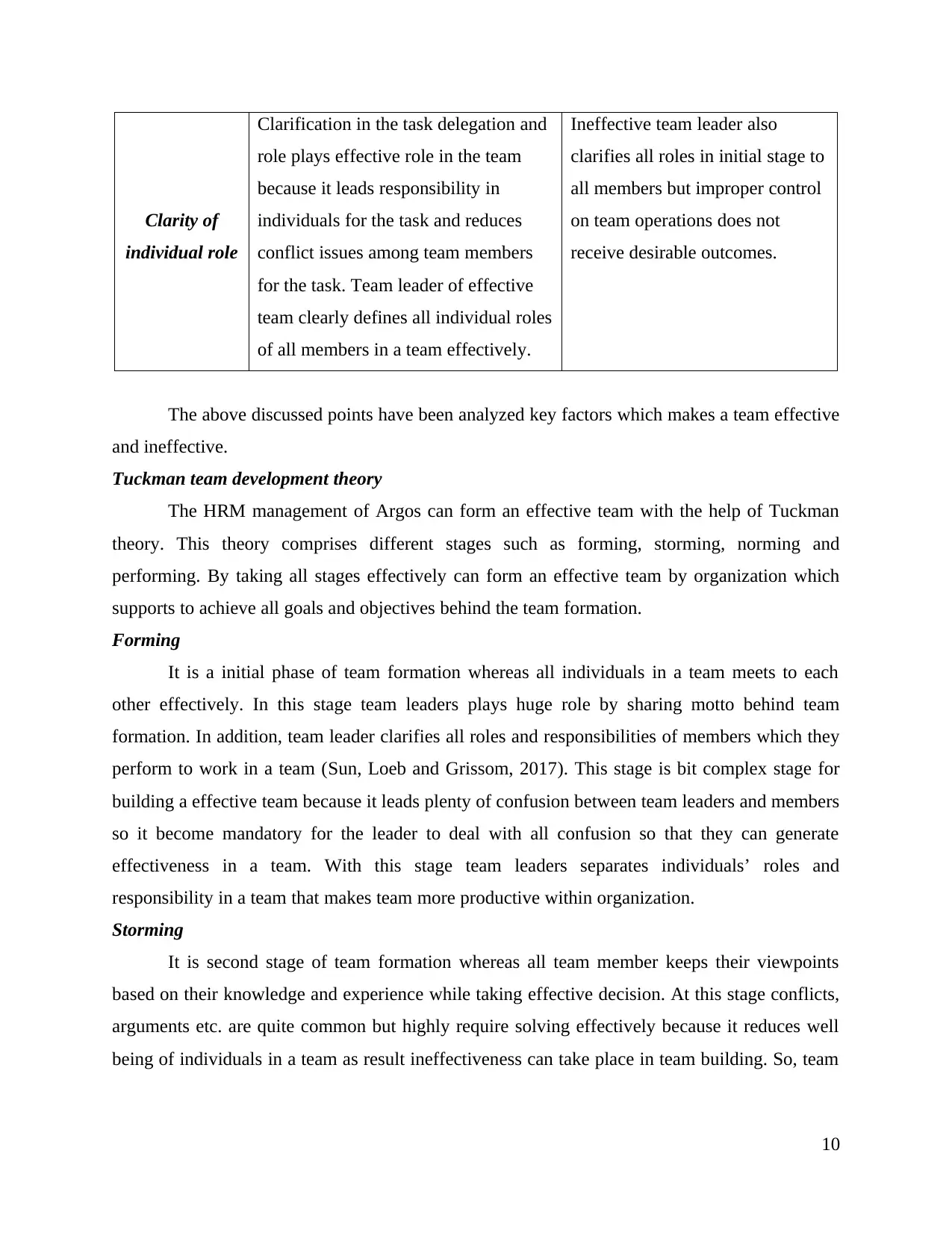
Clarity of
individual role
Clarification in the task delegation and
role plays effective role in the team
because it leads responsibility in
individuals for the task and reduces
conflict issues among team members
for the task. Team leader of effective
team clearly defines all individual roles
of all members in a team effectively.
Ineffective team leader also
clarifies all roles in initial stage to
all members but improper control
on team operations does not
receive desirable outcomes.
The above discussed points have been analyzed key factors which makes a team effective
and ineffective.
Tuckman team development theory
The HRM management of Argos can form an effective team with the help of Tuckman
theory. This theory comprises different stages such as forming, storming, norming and
performing. By taking all stages effectively can form an effective team by organization which
supports to achieve all goals and objectives behind the team formation.
Forming
It is a initial phase of team formation whereas all individuals in a team meets to each
other effectively. In this stage team leaders plays huge role by sharing motto behind team
formation. In addition, team leader clarifies all roles and responsibilities of members which they
perform to work in a team (Sun, Loeb and Grissom, 2017). This stage is bit complex stage for
building a effective team because it leads plenty of confusion between team leaders and members
so it become mandatory for the leader to deal with all confusion so that they can generate
effectiveness in a team. With this stage team leaders separates individuals’ roles and
responsibility in a team that makes team more productive within organization.
Storming
It is second stage of team formation whereas all team member keeps their viewpoints
based on their knowledge and experience while taking effective decision. At this stage conflicts,
arguments etc. are quite common but highly require solving effectively because it reduces well
being of individuals in a team as result ineffectiveness can take place in team building. So, team
10
individual role
Clarification in the task delegation and
role plays effective role in the team
because it leads responsibility in
individuals for the task and reduces
conflict issues among team members
for the task. Team leader of effective
team clearly defines all individual roles
of all members in a team effectively.
Ineffective team leader also
clarifies all roles in initial stage to
all members but improper control
on team operations does not
receive desirable outcomes.
The above discussed points have been analyzed key factors which makes a team effective
and ineffective.
Tuckman team development theory
The HRM management of Argos can form an effective team with the help of Tuckman
theory. This theory comprises different stages such as forming, storming, norming and
performing. By taking all stages effectively can form an effective team by organization which
supports to achieve all goals and objectives behind the team formation.
Forming
It is a initial phase of team formation whereas all individuals in a team meets to each
other effectively. In this stage team leaders plays huge role by sharing motto behind team
formation. In addition, team leader clarifies all roles and responsibilities of members which they
perform to work in a team (Sun, Loeb and Grissom, 2017). This stage is bit complex stage for
building a effective team because it leads plenty of confusion between team leaders and members
so it become mandatory for the leader to deal with all confusion so that they can generate
effectiveness in a team. With this stage team leaders separates individuals’ roles and
responsibility in a team that makes team more productive within organization.
Storming
It is second stage of team formation whereas all team member keeps their viewpoints
based on their knowledge and experience while taking effective decision. At this stage conflicts,
arguments etc. are quite common but highly require solving effectively because it reduces well
being of individuals in a team as result ineffectiveness can take place in team building. So, team
10
Paraphrase This Document
Need a fresh take? Get an instant paraphrase of this document with our AI Paraphraser
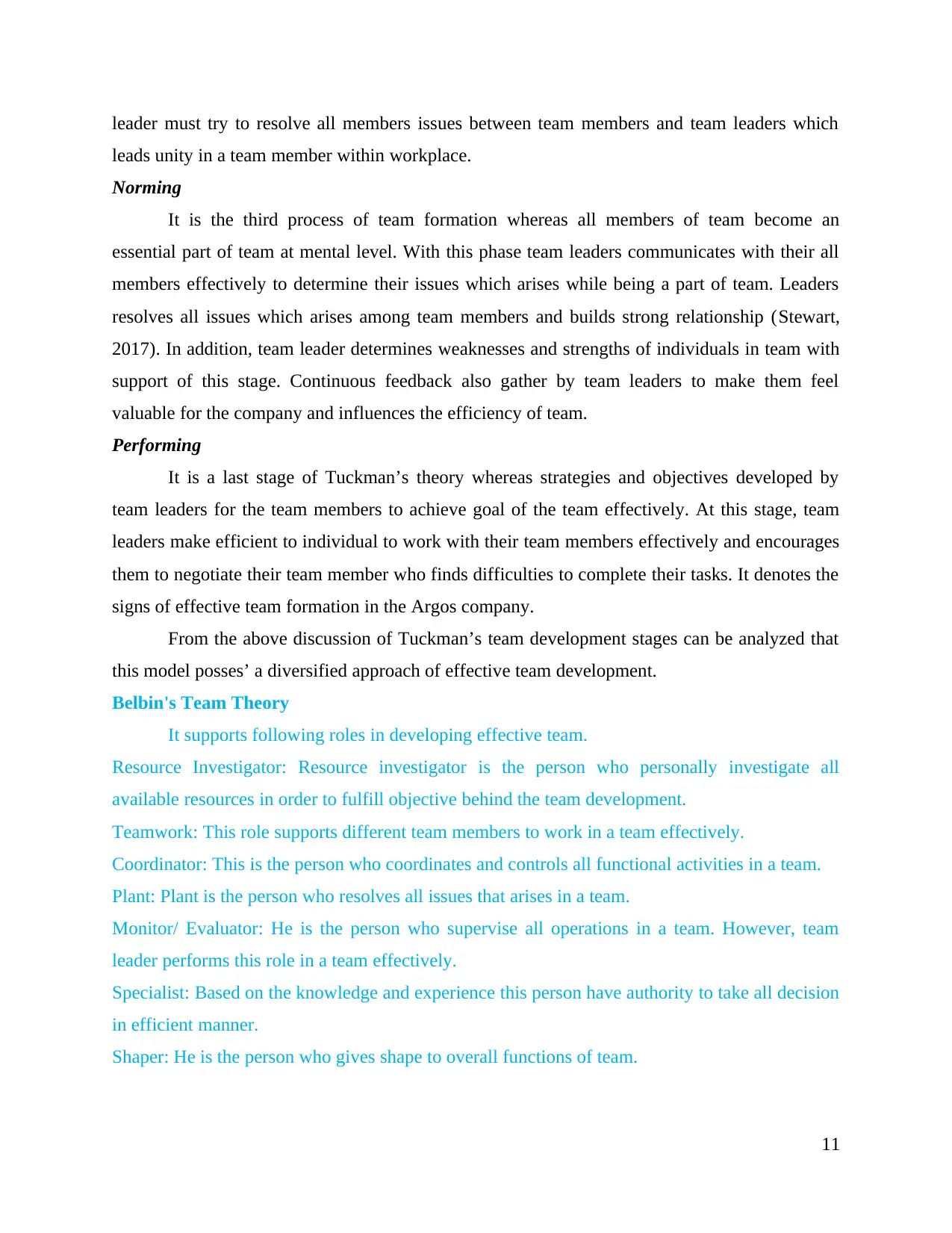
leader must try to resolve all members issues between team members and team leaders which
leads unity in a team member within workplace.
Norming
It is the third process of team formation whereas all members of team become an
essential part of team at mental level. With this phase team leaders communicates with their all
members effectively to determine their issues which arises while being a part of team. Leaders
resolves all issues which arises among team members and builds strong relationship (Stewart,
2017). In addition, team leader determines weaknesses and strengths of individuals in team with
support of this stage. Continuous feedback also gather by team leaders to make them feel
valuable for the company and influences the efficiency of team.
Performing
It is a last stage of Tuckman’s theory whereas strategies and objectives developed by
team leaders for the team members to achieve goal of the team effectively. At this stage, team
leaders make efficient to individual to work with their team members effectively and encourages
them to negotiate their team member who finds difficulties to complete their tasks. It denotes the
signs of effective team formation in the Argos company.
From the above discussion of Tuckman’s team development stages can be analyzed that
this model posses’ a diversified approach of effective team development.
Belbin's Team Theory
It supports following roles in developing effective team.
Resource Investigator: Resource investigator is the person who personally investigate all
available resources in order to fulfill objective behind the team development.
Teamwork: This role supports different team members to work in a team effectively.
Coordinator: This is the person who coordinates and controls all functional activities in a team.
Plant: Plant is the person who resolves all issues that arises in a team.
Monitor/ Evaluator: He is the person who supervise all operations in a team. However, team
leader performs this role in a team effectively.
Specialist: Based on the knowledge and experience this person have authority to take all decision
in efficient manner.
Shaper: He is the person who gives shape to overall functions of team.
11
leads unity in a team member within workplace.
Norming
It is the third process of team formation whereas all members of team become an
essential part of team at mental level. With this phase team leaders communicates with their all
members effectively to determine their issues which arises while being a part of team. Leaders
resolves all issues which arises among team members and builds strong relationship (Stewart,
2017). In addition, team leader determines weaknesses and strengths of individuals in team with
support of this stage. Continuous feedback also gather by team leaders to make them feel
valuable for the company and influences the efficiency of team.
Performing
It is a last stage of Tuckman’s theory whereas strategies and objectives developed by
team leaders for the team members to achieve goal of the team effectively. At this stage, team
leaders make efficient to individual to work with their team members effectively and encourages
them to negotiate their team member who finds difficulties to complete their tasks. It denotes the
signs of effective team formation in the Argos company.
From the above discussion of Tuckman’s team development stages can be analyzed that
this model posses’ a diversified approach of effective team development.
Belbin's Team Theory
It supports following roles in developing effective team.
Resource Investigator: Resource investigator is the person who personally investigate all
available resources in order to fulfill objective behind the team development.
Teamwork: This role supports different team members to work in a team effectively.
Coordinator: This is the person who coordinates and controls all functional activities in a team.
Plant: Plant is the person who resolves all issues that arises in a team.
Monitor/ Evaluator: He is the person who supervise all operations in a team. However, team
leader performs this role in a team effectively.
Specialist: Based on the knowledge and experience this person have authority to take all decision
in efficient manner.
Shaper: He is the person who gives shape to overall functions of team.
11
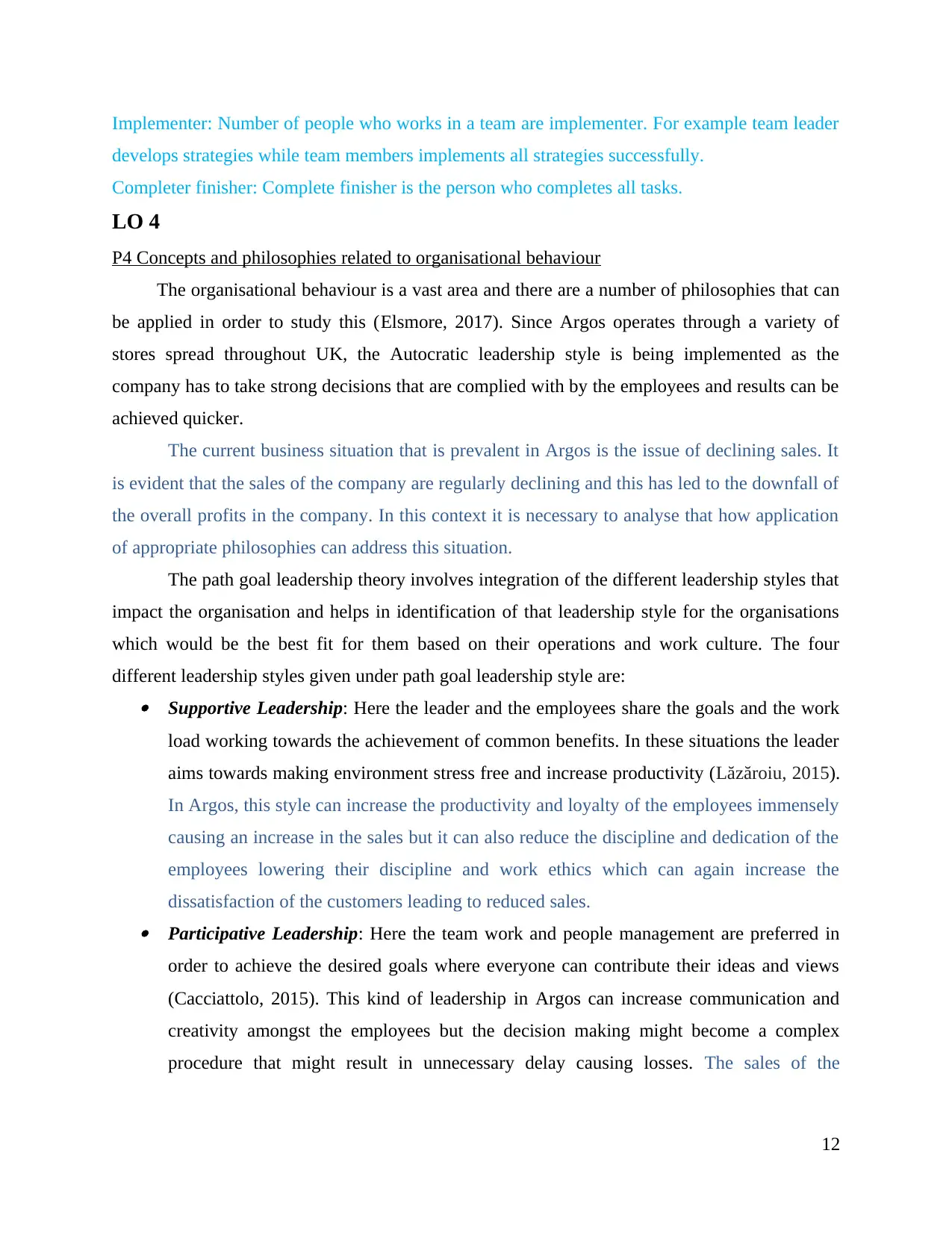
Implementer: Number of people who works in a team are implementer. For example team leader
develops strategies while team members implements all strategies successfully.
Completer finisher: Complete finisher is the person who completes all tasks.
LO 4
P4 Concepts and philosophies related to organisational behaviour
The organisational behaviour is a vast area and there are a number of philosophies that can
be applied in order to study this (Elsmore, 2017). Since Argos operates through a variety of
stores spread throughout UK, the Autocratic leadership style is being implemented as the
company has to take strong decisions that are complied with by the employees and results can be
achieved quicker.
The current business situation that is prevalent in Argos is the issue of declining sales. It
is evident that the sales of the company are regularly declining and this has led to the downfall of
the overall profits in the company. In this context it is necessary to analyse that how application
of appropriate philosophies can address this situation.
The path goal leadership theory involves integration of the different leadership styles that
impact the organisation and helps in identification of that leadership style for the organisations
which would be the best fit for them based on their operations and work culture. The four
different leadership styles given under path goal leadership style are: Supportive Leadership: Here the leader and the employees share the goals and the work
load working towards the achievement of common benefits. In these situations the leader
aims towards making environment stress free and increase productivity (Lăzăroiu, 2015).
In Argos, this style can increase the productivity and loyalty of the employees immensely
causing an increase in the sales but it can also reduce the discipline and dedication of the
employees lowering their discipline and work ethics which can again increase the
dissatisfaction of the customers leading to reduced sales. Participative Leadership: Here the team work and people management are preferred in
order to achieve the desired goals where everyone can contribute their ideas and views
(Cacciattolo, 2015). This kind of leadership in Argos can increase communication and
creativity amongst the employees but the decision making might become a complex
procedure that might result in unnecessary delay causing losses. The sales of the
12
develops strategies while team members implements all strategies successfully.
Completer finisher: Complete finisher is the person who completes all tasks.
LO 4
P4 Concepts and philosophies related to organisational behaviour
The organisational behaviour is a vast area and there are a number of philosophies that can
be applied in order to study this (Elsmore, 2017). Since Argos operates through a variety of
stores spread throughout UK, the Autocratic leadership style is being implemented as the
company has to take strong decisions that are complied with by the employees and results can be
achieved quicker.
The current business situation that is prevalent in Argos is the issue of declining sales. It
is evident that the sales of the company are regularly declining and this has led to the downfall of
the overall profits in the company. In this context it is necessary to analyse that how application
of appropriate philosophies can address this situation.
The path goal leadership theory involves integration of the different leadership styles that
impact the organisation and helps in identification of that leadership style for the organisations
which would be the best fit for them based on their operations and work culture. The four
different leadership styles given under path goal leadership style are: Supportive Leadership: Here the leader and the employees share the goals and the work
load working towards the achievement of common benefits. In these situations the leader
aims towards making environment stress free and increase productivity (Lăzăroiu, 2015).
In Argos, this style can increase the productivity and loyalty of the employees immensely
causing an increase in the sales but it can also reduce the discipline and dedication of the
employees lowering their discipline and work ethics which can again increase the
dissatisfaction of the customers leading to reduced sales. Participative Leadership: Here the team work and people management are preferred in
order to achieve the desired goals where everyone can contribute their ideas and views
(Cacciattolo, 2015). This kind of leadership in Argos can increase communication and
creativity amongst the employees but the decision making might become a complex
procedure that might result in unnecessary delay causing losses. The sales of the
12
⊘ This is a preview!⊘
Do you want full access?
Subscribe today to unlock all pages.

Trusted by 1+ million students worldwide
1 out of 17
Related Documents
Your All-in-One AI-Powered Toolkit for Academic Success.
+13062052269
info@desklib.com
Available 24*7 on WhatsApp / Email
![[object Object]](/_next/static/media/star-bottom.7253800d.svg)
Unlock your academic potential
Copyright © 2020–2026 A2Z Services. All Rights Reserved. Developed and managed by ZUCOL.





